 Petzlover
Petzlover Both Basset Artesien Normand and Grand Basset Griffon Vendeen are originated from France. Basset Artesien Normand may grow 9 cm / 3 inches shorter than Grand Basset Griffon Vendeen. Both Basset Artesien Normand and Grand Basset Griffon Vendeen are of same weight. Both Basset Artesien Normand and Grand Basset Griffon Vendeen has almost same life span. Basset Artesien Normand may have less litter size than Grand Basset Griffon Vendeen. Basset Artesien Normand requires Low Maintenance. But Grand Basset Griffon Vendeen requires Moderate Maintenance
Both Basset Artesien Normand and Grand Basset Griffon Vendeen are originated from France. Basset Artesien Normand may grow 9 cm / 3 inches shorter than Grand Basset Griffon Vendeen. Both Basset Artesien Normand and Grand Basset Griffon Vendeen are of same weight. Both Basset Artesien Normand and Grand Basset Griffon Vendeen has almost same life span. Basset Artesien Normand may have less litter size than Grand Basset Griffon Vendeen. Basset Artesien Normand requires Low Maintenance. But Grand Basset Griffon Vendeen requires Moderate Maintenance
 The Basset Artesien Normand hails from Normandy, France. He was bred around the middle ages and was a popular breed with the royalty of France when they met for hunting with hounds. How the Basset was developed isn’t known, but in the 1800s the dog’s popularity grew, and Napoleon himself was a fan. With some people wanting hunting skills in their dog, others good looks and some wanting a heavier dog, the Basset Artesien Normand or the BAN emerged.
The Basset Artesien Normand hails from Normandy, France. He was bred around the middle ages and was a popular breed with the royalty of France when they met for hunting with hounds. How the Basset was developed isn’t known, but in the 1800s the dog’s popularity grew, and Napoleon himself was a fan. With some people wanting hunting skills in their dog, others good looks and some wanting a heavier dog, the Basset Artesien Normand or the BAN emerged.
Some people believe that the Basset came from a mix of French hounds crossed with smallish breeds such as Beagles and Dashshunds.The truth is that the Basset’s origin is up for debate, but the Basset Artesian Normand took over in popularity from the Basset Normand and the Basset Chien d’Artois. These dogs are now extinct.
The first record of Bassets in America came from the 1700’s when a number of Bassets were presented to George Washington as gifts. It is uncertain what type of Bassets they were, but quite likely they were Basset Artesian Normands. The breed club was established in 1910 and given its present name in 1924. The dog is also recognized by the United Kennel Club in the Scenthound group.
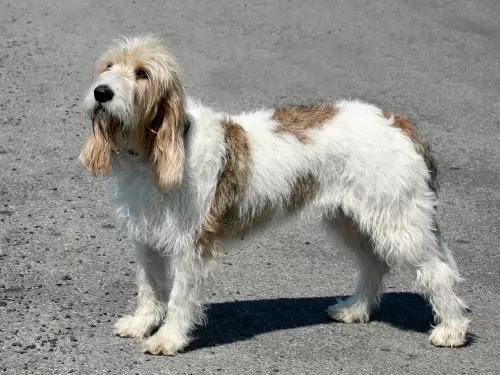 The Grand Basset Griffon Vendeen is a French scenthound that has changed over many centuries and today the area in France where they originate from, has contributed to the dog's looks.
The Grand Basset Griffon Vendeen is a French scenthound that has changed over many centuries and today the area in France where they originate from, has contributed to the dog's looks.
The rocky and thorny region of Vendeé required a hardy breed of dog. Also, hunters wanted a slower hound that they could keep up with, and the idea was to shorten the legs of the dog.
By the end of the 19th century, the Basset Griffon Vendéen was developed. By the 1950s, the Grand was considered a separate breed. and Petit was not banned until 1977.Today the dog is a long-backed and short-legged hunting dog.
 The BAN is a small to medium sized dog, between 30 and 36 cm and weighing anything up to 20kg. He is low maintenance in terms of his short coat which is tri-colored – fawn, white with a black patch across the back. He has a long tail which is often held in an upright position. You can’t miss those long ears, which are a distinctive feature of this gentle, good-natured dog and which are low-set on the head. Add to that the dark, soulful eyes and you get a look that ‘wouldn’t hurt a fly.’
The BAN is a small to medium sized dog, between 30 and 36 cm and weighing anything up to 20kg. He is low maintenance in terms of his short coat which is tri-colored – fawn, white with a black patch across the back. He has a long tail which is often held in an upright position. You can’t miss those long ears, which are a distinctive feature of this gentle, good-natured dog and which are low-set on the head. Add to that the dark, soulful eyes and you get a look that ‘wouldn’t hurt a fly.’
The BAN is very similar to the regular Basset Hound but he is much slimmer. This is also because although he is a companion, he was at first a hunting canine, and is fit and muscular when fed the correct diet.
The Basset Artesien Normand is a friendly, affectionate dog, becoming a beloved pet of the family that he loves to be with. His gentle nature means that he won’t score high as a guard dog. He is gentle and affectionate with children in the home, and with some training and socialization he gets on well with other pets in the family. They’re fairly intelligent and you’ll be able to train him to carry out some important commands. As a hound, he tends to want to wander, and it is always a good idea to have him on a leash when out and about with him.
This breed of dog will need a good amount of exercise and other activities, even if it means climbing onto the couch and watching a movie with you. He can’t be left in the garden day after day on his own, and you’ll need to take him on daily walks and give him a game. Exercise is of particular importance for a dog like this, as he can easily put on weight and battle with back problems.
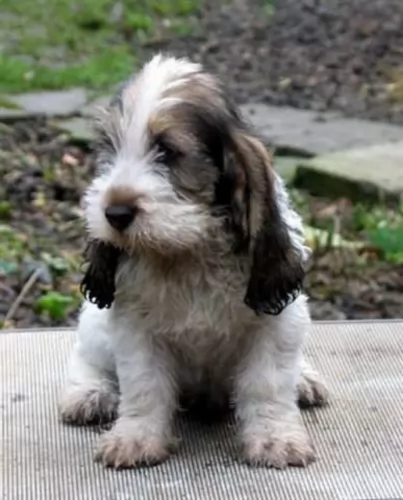 Kept today essentially as a domestic pet, the Grand Basset Griffon Vendéen is a strongly built dog, a rough-coated scent hound of medium size standing at roughly 39 to 45cm in height and weighing 18 to 20kg.
Kept today essentially as a domestic pet, the Grand Basset Griffon Vendéen is a strongly built dog, a rough-coated scent hound of medium size standing at roughly 39 to 45cm in height and weighing 18 to 20kg.
The coat is medium length, shaggy and wiry. It is essentially white with orange markings. Sometimes he can be tri-colored, having a combination orange, black or tan markings. The Grand Basset Griffon Vendeen’s coat is double with a thick, weather-resistant undercoat and a rough, harsh topcoat. In addition to regular brushing, this breed’s coat needs to be hand-stripped once a year.
His legs are straight, and he is longer than he is tall. He is a deep chested dog with long ears and a long tail. He is also noted for his mustache and beard with long eyebrows.
Your Grand Basset is a courageous, happy, confident dog, active and having great stamina.
He is a social, pack dog so he will be wanting plenty of time spent with his owner, failing which the owner should invest in another dog too. He will get on great with children and he is also a pet-friendly breed who will get on well with cats too. He is sharp and alert and responds well to training and socialization.
 The Basset Artesien Normand is such a family friend with his docile personality. Short of stature, he has a keen sense of smell, much like the Bloodhound. With his short, smooth coat, he won’t require much from you in terms of grooming. His long ears, his sad eyes and his outward turned paws are all characteristics which endear him to dog lovers.
The Basset Artesien Normand is such a family friend with his docile personality. Short of stature, he has a keen sense of smell, much like the Bloodhound. With his short, smooth coat, he won’t require much from you in terms of grooming. His long ears, his sad eyes and his outward turned paws are all characteristics which endear him to dog lovers.
He doesn’t like to be left alone. This Basset is yours and he wants to be part of all the action in the house, and that includes meals. He has a hearty appetite, but you don’t want to be feeding him your scraps as he can put on weight quickly. This won’t be good for his health, and as a responsible pet owner, you need to be watching his weight.
Don’t forget his daily walk that he loves so much. Treat him with love and kindness and you’ll have yourself a happy, good-natured companion.
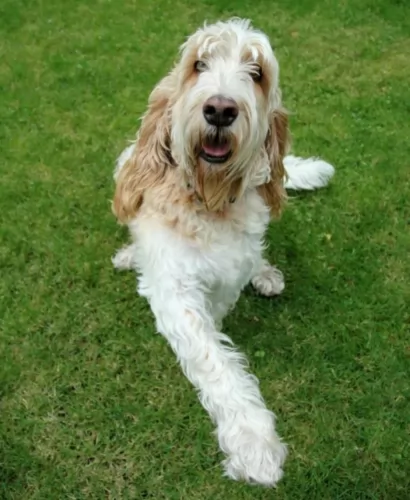 This long-backed, short legged hunting dog has a happy, confident personality.
This long-backed, short legged hunting dog has a happy, confident personality.
While he was used originally for hunting, he is now commonly kept as a companion dog. He is energetic and independent and will require you having him join you for walks and a ball game too.
Non-aggressive and adaptable he can live in the city or in the countryside so long as he receives plenty of attention and love – then he'll be a splendid pet.
 The Basset Artesian Normand is a fairly healthy breed and you can expect him to reach 15 years, although you have to bear in mind that this breed is susceptible to some common health defects. As already mentioned, these long-bodied, short-legged dogs are prone to back problems. Weight gain is common in these dogs and additional weight will aggravate your dog’s back problems.
The Basset Artesian Normand is a fairly healthy breed and you can expect him to reach 15 years, although you have to bear in mind that this breed is susceptible to some common health defects. As already mentioned, these long-bodied, short-legged dogs are prone to back problems. Weight gain is common in these dogs and additional weight will aggravate your dog’s back problems.
While hip dysplasia is a genetic disease found more commonly in large dog breeds, it can also affect smaller breeds like the Basset. Your dog may develop a different way of walking and running and he may even resist movement as he can experience stiffness and pain in the rear legs. Hip dysplasia is mostly an inherited condition. Proper diet and exercise can help with preventing the disease.
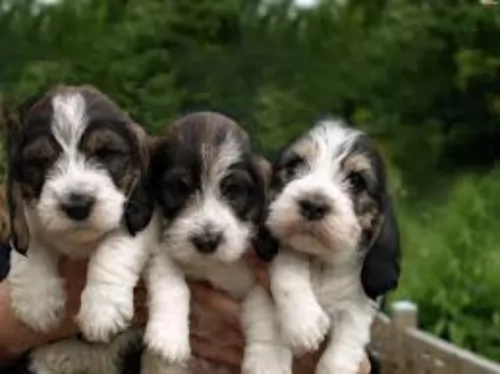 There are some Basset Griffon Vendéens that have reached 17 years of age. This is excellent for these dogs and lifestyle, nutrition and exercise can all play a part in the longevity of any dog.
There are some Basset Griffon Vendéens that have reached 17 years of age. This is excellent for these dogs and lifestyle, nutrition and exercise can all play a part in the longevity of any dog.
Generally they live to be 10 to 14 years of age. While he is a pretty robust dog, you'll want to be aware of some of the diseases which may require veterinary intervention -
Cancer is a major cause of death in elderly dogs, but if caught early, the dog can be cured. These cancers can be malignant lymphoma, skin cancer, bone cancer or soft tissue sarcomas. You'll notice a lump on your pet or a wound they won't heal. When you notice your dog not feeling well, get him to the vet.
A common form of heart disease in dogs is valvular disease, heartworm disease and myocardial disease. The signs of heart disease in your pet will depend on the severity of the disease and type. As heart disease moves on to congestive heart failure, you'll notice symptoms such as difficulty with breathing, fatigue, loss of appetite and weight loss. You need to get your dog immediately to the vet.
Dog allergies can be caused by pollen, medications, food or insects. You'll notice your pet scratching, he'll have watery eyes and inflamed skin. This inflammatory condition can cause a lot of agony for your pet, driving him mad with pain and the desire to scratch and lick. Relieve his discomfort by getting him to the vet as soon as possible.
 The Basset Artesian Normand has a short, smooth coat and this will ensure that he is low maintenance. A regular brush twice a week will ensure you get rid of loose hairs.
The Basset Artesian Normand has a short, smooth coat and this will ensure that he is low maintenance. A regular brush twice a week will ensure you get rid of loose hairs.
Ear Infections - as is the case with long eared dogs, the Basset Artesian Normand is susceptible to ear infections. Check with your vet if you aren’t sure how to clean your dog’s ears so that you can prevent ear infections.
Brush your dog’s teeth about 2 or 3 times a week with special dog toothpaste- and brush. His nails will also need to be clipped regularly, more so if he doesn’t get to run on hard surfaces which wear the claws down.
You can speak to your veterinarian about wet- and dry dog foods and which type of food would suit your pet best. The type of food you give him, his age and his activity levels will be a guide on how to choose his food. Always make sure that a bowl of fresh, cool water is readily available to your 4-legged friend.
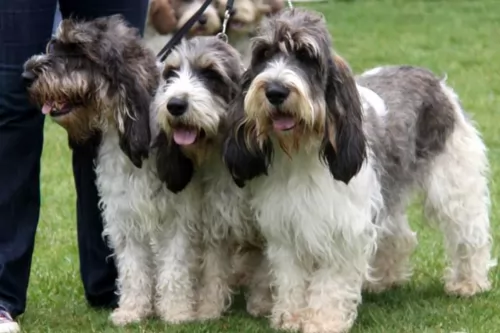 If you are going to be feeding your Grand Basset Griffon Vendéen kibble, there are excellent brands that bring out breed-specific formulas for age, size and energy levels of dogs.
If you are going to be feeding your Grand Basset Griffon Vendéen kibble, there are excellent brands that bring out breed-specific formulas for age, size and energy levels of dogs.
Feeding a dog is an individual choice, but good food can increase his longevity. A bit of raw meat mixed into his kibble, or some cooked brown rice, vegetables and chicken will be excellent for him. This can be a tasty variety to his diet.
Fresh, cool water must always be available at all times.
The Grand Basset Griffon Vendeen’s coat is double and the rough, harsh coat will need brushing twice a week and stripped once a year.